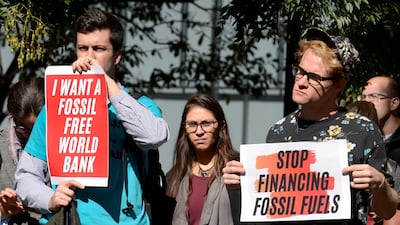The Black Country Museum, near Birmingham in the UK, is a monument to the 18th Century’s Industrial Revolution. The area got its name from the coal found close to the surface, or the smoke from its burning. If environmental campaigners have their way, other areas would soon change from centres of wealth and power to museums of the obsolete oil and gas business.
On November 15, the European Investment Bank (EIB) announced it would stop funding all fossil fuels projects at the end of 2021. For some years, coal has become increasingly unpopular, but the decision to end funding for oil, and particularly gas, is more striking. The gas industry has promoted its product as a relatively clean fuel: minimal air pollutants, and just half the carbon dioxide emissions of coal. Now they, too, are in the crosshairs.
The Trump administration in the US may have attempted to turn back the clock on environmental policies, but the various Democratic challengers are under activist pressure to put forward more radical climate plans, several centring around a "green New Deal". The UK has committed to eliminate net carbon dioxide emissions by 2050, while the Labour Party in the current election promises a zero-carbon energy system and a ban on new petrol or diesel car sales by 2030.
The aim is laudable and essential. European oil and gas companies have already read the writing on the wall, and begun turning to investments in floating offshore wind turbines, solar power, batteries and electric vehicle charging. The US’s Occidental is pressing ahead with extracting carbon dioxide from the air and injecting it underground to enhance oil recovery while permanently trapping it. All major gas companies have realised they need to do more to reduce leakage of methane, the main constituent of natural gas, but a powerful greenhouse gas in its own right.
European oil firms have already lost the battle for public opinion, even if they retain some influence over policymakers. Yet the demonisation of fossil fuels is problematic too, on four counts.
Firstly, the scale and speed of the challenge is not appreciated by the general population. The UK alone will need to install 4,000 electric vehicle charging points and heat pumps for homes every day from now to 2050 to meet its goals. If the transition leads to much higher energy prices or blackouts, public opinion could reverse, blocking the new momentum on climate action.
Secondly, the focus only on “net zero” targets is misguided. What matters for climate is not the emissions in a particular year, but the cumulative emissions over a long period. Switching coal for gas has caused the UK’s emissions to fall faster than any other major economy.
Thirdly, the effect of the transition on employees, communities and countries has to be managed. As with the Black Country, or coal-mining communities across northern England, north-eastern France, or West Virginia, or Detroit's "Motor City", the loss of traditional industries hits hard. New jobs in renewables or electric vehicle manufacturing will not necessarily be in the same place or need the same skills.
Fourthly, the Eurocentric or Western-centric debate misses more than 80 percent of the global population. Climate is an important concern for China and India now, but more immediate is the fight against coal pollution, which can be easily cleaned up with gas.
Almost a billion people, mainly in Africa but also across South Asia, lack access to modern energy. Their needs are relatively trivial in a Western context: a few watts to run a lightbulb and television, charge a phone, and some gas or electricity for cooking and heating.
Renewable advocates extol the benefits of decentralised “microgrids” in remote communities, running on solar, wind and rivers. These indeed have great potential for enabling people to take the first steps to electrification. The analogy is made with mobile phones, which have enabled Africa to leapfrog land-lines.
But 40 per cent of the sub-Saharan African population is now urban, living in emerging megacities such as Lagos, Johannesburg, Kinshasa and Dakar. These cities need industrial employment and large-scale power provided by utility-scale wind and solar farms alongside gas.
Senegal's energy minister, Mouhamadou Cisse, recently explained how his country would use its new offshore gas discoveries, alongside renewable energy, to replace coal and bring power and industry to his country people. The urgency of the situation does not permit well-meaning experiments at running countries entirely on renewables, barely achieved anywhere.
Developing countries also accuse high-income countries of hypocrisy, of denying them the use of their own natural resources, when the West’s wealth was built on fossil fuels and its outsize per capita consumption continues. And poorer countries, especially in the tropics and subtropics, are most exposed to rising temperatures, desertification and the other plagues of climate change.
If relatively clean energy is not financed by the EIB and other western institutions, then others such as China will step in. Research by my colleague David Sandalow at Columbia University's Centre on Global Energy Policy has shown that the electricity side of Beijing's Belt and Road Initiative focuses almost entirely on constructing coal power plants abroad, mostly of low efficiency.
Fossil fuel companies should not use “energy access” as a cynical tactic to perpetuate dependence on coal, oil and gas in developing countries. The threat of losing public acceptability and financing is real and growing. But a blanket ban is counterproductive. A hybrid energy industry blending renewables, electricity, hydrogen, carbon capture and gas has the best chance of being financially, environmentally and socially sustainable.
Robin Mills is chief executive of Qamar Energy, and author of The Myth of the Oil Crisis


